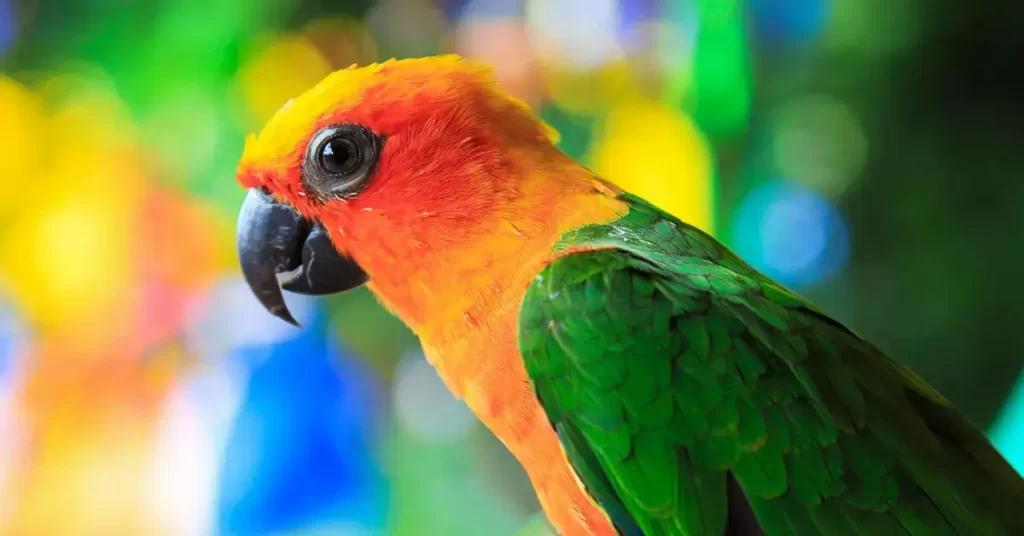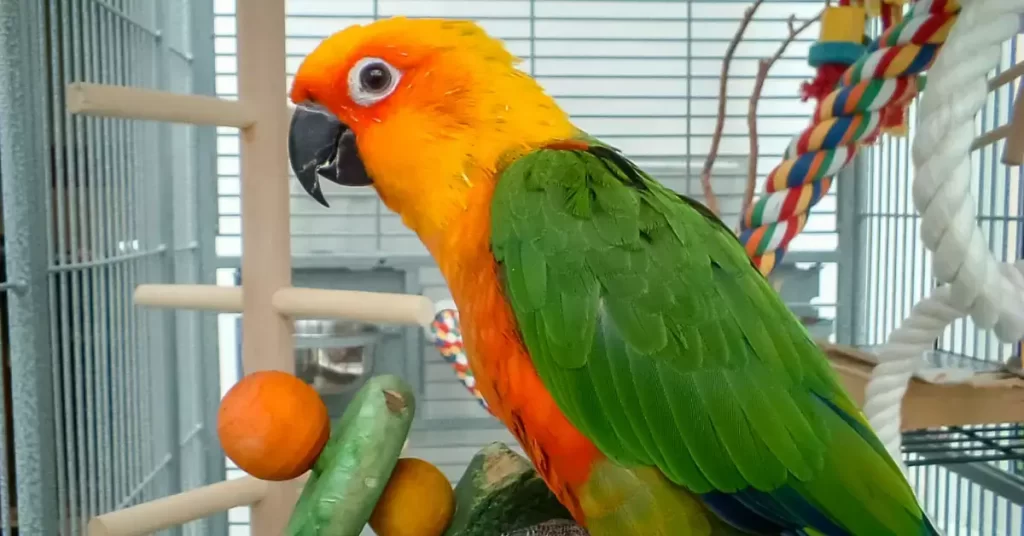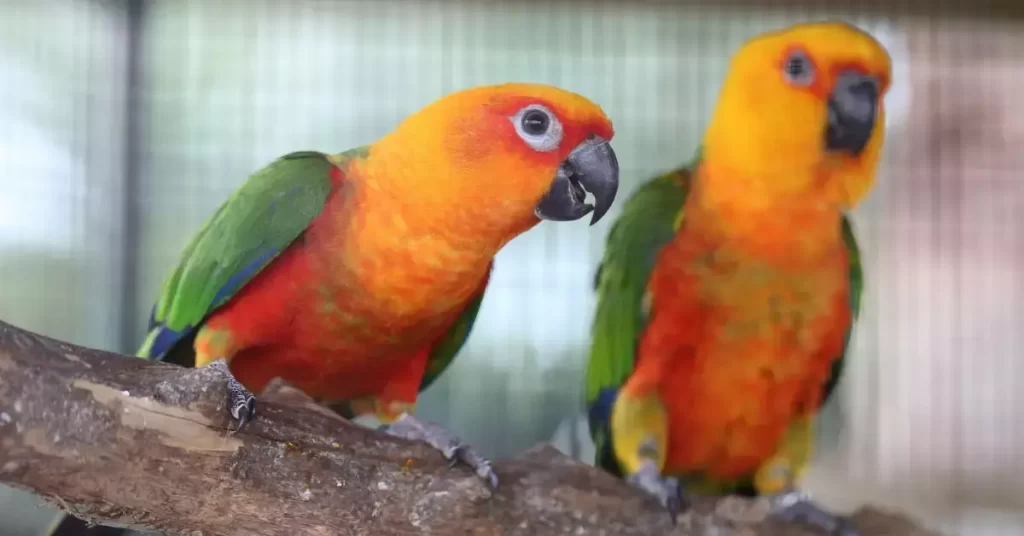Jenday Conure ( Jandaya Parakeet ) – Breeding, And Care

Are you looking for a pet bird? If so, the Jenday Conure might be perfect for you!
This small Neotropical parrot has an average lifespan of 25 to 30 years and can live over 30 years. The Jenday conure is native to Brazil and is known for its intelligence, agility, friendliness, and vocalizing abilities.
The personality of this medium-sized bird ranges from sweet-tempered to demanding. When trained well enough they are capable of mimicking words or phrases in English or Portuguese with accuracy.
They are also known as being very playful birds who enjoy playing with other pets such as dogs or cats. Jendays come in many different colors including white, yellow, orange/red, blue, and green. The green variety is the most common. Males and females look alike, except that males tend to be a little bit larger than females.
If you are interested in adding a Jenday Conure to your family, be sure to read this article first.
Jenday Conure Personality And Behaviour:

Jenday Conures are very active birds that need a lot of attention and stimulation. They can be playful and entertaining, but they can also be very demanding.
Jendays require a lot of interaction and need to be handled frequently. Jenday Conures are intelligent, colorful birds that are very active.
This means they need to have a safe, spacious cage with plenty of toys so they can climb and play. They need a time out of their cages to exercise by playing on the floor.
A Jenday also needs social interaction every day in order for it to be happy and well-adjusted. Without regular attention, a Jenday can become demanding and may start plucking its feathers.
Jendays are very playful birds and enjoy interactive games like peek-a-boo or chase. They also love to chatter and whistle. If you don’t have the time to give your bird these interactive activities, then a Jenday may not be the right pet bird for you. This is a medium-sized, stocky conure with a mean look about it.
The jenday parrot is mostly green with touches of yellow and blue. The tail feathers are blue with yellow tips and it has orange cheeks. Males have more of a blue and yellow head than the female jenday, who has more of a green and yellow head. The beak is horn colored and the legs are greyish.
Jendays typically live 25 to 30 years, if properly cared for.
They don’t usually talk or whistle well but can learn to mimic words or phrases. There are a few things that can cause a Jenday to become depressed or unhappy, such as lack of socialization and handling.
Without these things, a Jenday will not be confident enough to breed and may start plucking its feathers out as well.
This can lead to more serious problems if the birds are not treated. Jenday Conures are not naturally aggressive but can become frustrated if they don’t have enough time for social interaction, play, and exercise outside the cage. Aggression is more common in male Jendays than it is in female Jendays.
Tips On Caring For Your Jenday Conure Bird:

The Jenday Conure is a long-tailed bird. They eat a seed mix that includes seeds from plants such as sunflower, canary, millet, flax, and hemp.
Food should be fed in a dish twice a day and the cage should be cleaned every two weeks.
The Jenday Conure does not require a very large cage, their cages should be no smaller than 36×24 inches and the bar spacing should be 1/2 inch or less.
For a single bird, at least a two-story cage will be necessary, but if you have an extra bird you could have up to three in a single cage. The bottom of the cage should be lined with newspaper, which makes it easy to clean and replace when needed.
Jenday Conure birds need to be around their owners for a large part of the day. As I said earlier, they require a lot of attention and interaction with their owners and if left alone they can become depressed and start plucking out their own feathers, which is not healthy at all.
The best thing you can do for your Jenday Conure bird is to keep it with you as much as possible.
When buying toys for your Jenday Conure, you should look for toys that are safe and can be chewed on because they love to chew!
They also love to climb so having a lot of different branches in the cage for them to play with would be beneficial.
One thing that is very important when it comes to Jenday Conure bird care is to have fun with your bird! They are also very intelligent and love to play, so make sure you interact with your bird as often as possible.
As with any pet, it is important to understand the proper care and needs of your jenday conure.
If you want a happy and healthy bird that will bring years of enjoyment into your life then it is important to properly care for them.
One of the most important things to remember is that conures need a healthy diet. This means that you should avoid feeding them foods that are bad for them. Some of the foods that you should avoid include:
Feeding your conure these types of foods can lead to health problems such as obesity, diabetes, and liver disease. It is important to consult with a veterinarian if you are unsure about what foods are safe for your bird. In addition, make sure to provide your bird with a variety of fresh fruits and vegetables. Conures enjoy:
By providing your bird with a healthy diet you can help ensure that they live a long and healthy life.
Can Jenday Conures Talk?
It is difficult to say for certain. There are many different theories that exist about the intelligence of these birds. One theory suggests that the intelligence of the jenday conures is more closely related to their ability to mimic human speech.
Some people suggest that this type of intelligence is not very impressive because it only entails mimicking sounds already present in the human world. Other people argue that this type of intelligence goes beyond what other animals can do.
All of the conure species are believed to have the ability to mimic human speech to some extent. This ability has not been studied as extensively in other species as it has been in the jenday conure, but there is evidence to suggest that all conures have this ability.
One study found that green-cheeked conures were able to imitate the sounds of their human caregivers with a high degree of accuracy. This study also showed that the conures were able to remember and replicate the sounds they had heard long after the original sound had stopped.
This suggests that all conures have the ability to mimic human speech, though some species may be more adept at it than others.
Breeding Of Jenday Conure:

The Breeding of the Jenday Conure is a process that can be difficult for some bird owners.
The Jenday Conure is a beautiful bird that can be a great addition to any home, but making sure that they are bred properly is important to the health and well-being of the birds. There are a few things that you need to keep in mind when breeding Jenday Conures.
First, you need to make sure that you have a healthy male and female bird. The birds should also be fully mature before you attempt to breed them.
In addition, the birds should be kept in a suitable environment with plenty of room to fly and exercise.
The process of breeding Jenday Conures is a little different from the process of breeding other species of birds.
The girl bird should be introduced to the breeding Jenday Conures is similar to that of other parrots. The male bird will search for the female in order to breed with her. When he finds her, they will engage in courtship behavior.
This is often when the most noise occurs, so you may need to be patient with them at this time. The breeding process itself typically lasts about an hour, but the two birds will be together for much longer.
It is important that both of them have plenty of time to breed with one another in order to ensure that they are both satisfied and healthy.
After the actual breeding process, you need to separate your male Jenday Conures from your female Jenday Conures. This is because the female would likely be harassed and attacked by the male if you did not separate them.
It is important that the birds be kept well away from one another for at least a day or two before you attempt to reintroduce them.
The reintroduction process should go relatively smoothly because your Jenday Conures will already have mated once, so they will want to do it again. After mating, you should keep your female Jenday Conures in the same area as before so that she can lay her eggs when they are ready.
When this happens, it is important to make sure that you have an incubator available for them. If one has not been purchased, then a qualified avian veterinarian can help to set one up for you.
The eggs will usually take about 22 to 28 days to hatch, so you will need to be patient. Once the eggs have hatched, you will need to keep the chicks in a warm and safe environment until they are ready to be weaned. Weaning them from their parents typically takes about six weeks.
By this time, the Jenday Conure Baby will be ready to go and live in a new home. This is where you can find them if you are looking for a new pet bird!
The process of breeding Jenday Conures is not difficult, but it has its challenges that must be met before the eggs will hatch.
If you are patient and take the time to set up a proper environment for your birds, then they will likely breed without any problems.
Jenday Conure Vs Sun Conure:
Jenday Conures are from northeastern Brazil. They have a red-orange body with a blackhead, chest, and tail feathers. Sun conures are from northeastern South America.
They have a mostly green body with a yellow head, breast, and tail feathers. Jenday Conures are considered timider than Sun conures and are not as commonly found in aviculture. Sun conures are more commonly bred in captivity and are considered more friendly.
Jenday Conures typically live around 20 years, while Sun Conures can live up to 30 years. And also Jenday conures are a little more difficult to breed than Sun Conures.
How Much Do They Cost And What Their Average Lifespan Is?
The Jenday Conure is among the most popular pet birds. They are becoming more common because their lifespan is quite long compared to other species of pet parrots.
These birds can live for about 15 – 30 years on average. The jenday Conure’s average price ranges between $600 and $1800 depending on where you buy them from.
Faq:
Are Jenday Conures Good Pets?
This is a question that many people have when looking for a new pet. They are popular pets because they are beautiful and friendly. Jenday conures are a good choice for a pet because they are social and enjoy interacting with people. They can be taught to do tricks and love to play games. They are very active and enjoy climbing, chewing, and playing with toys. In addition, they whistle a lot of the time.
Are Jenday Conures Cuddly?
Yes, Jenday Conures are very cuddly. They love to snuggle with their favorite person and will not leave his/her side unless given the opportunity to do so. Additionally, they are very curious birds that will often want to explore every inch of your home for themselves. They are not afraid of heights or stairs either! Jenday Conures are also prone to plucking their feathers if they do not receive appropriate stimulation from their owner. This is why jendays need a lot of attention and affection!
Are Jenday Conures Louder Than Sun Conures?
A jenday conure’s typical call is louder than a sun conure’s. However, this can vary depending on an individual bird and the way it has been socialized with humans.
Why Is My Jenday Conure Biting Their Feathers?
Feather plucking, wing feather biting, and excessive noise are all common signs of being bored with the environment. A Jenday conure needs a new toy or exercise to keep it occupied.
Wing feather biting is often caused by too much close contact with other pets in the home. Provide more space for your bird to roam around. It should be easier to control the problem if you purchase some behavior-changing toys that can be placed near the perch or cage.
The Jenday conure also has extremely sensitive hearing and will respond to any sudden noises like the TV on, sudden noises like thunderstorms, or sudden noises like an alarm clock going off.
Final Thoughts:
The Jenday Conure is a sweet, affectionate little bird that can make an excellent pet for the right person. They are intelligent and curious birds who are always on the go.
If you live in a large enough home with lots of windows to keep them stimulated during the day, they might be perfect for you.
These birds require plenty of attention, toys, and interaction to remain healthy and happy. They can be a great addition to the family, but only if you are prepared to meet their needs.
However, if your schedule changes often or you don’t have much time to spend playing with your new friend every day, this may not be the best choice for you.

